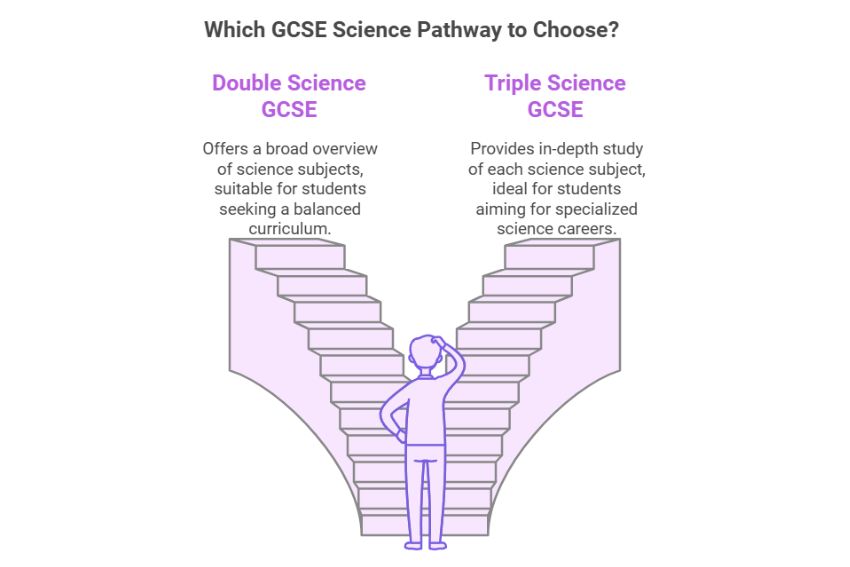Double Science GCSE: Everything You Need to Know
Double Science GCSE, also called GCSE Double Award Science, is a popular choice for secondary school students. It covers Biology, Chemistry, and Physics but awards two GCSE grades instead of three. This option provides a balanced way to study science, offering a strong foundation in key scientific principles without the extra workload of Triple Science.
Studying science at GCSE Coursework develops critical thinking, analytical skills, and problem-solving abilities. These are valuable for everyday life and future careers. Double Science provides the knowledge and skills needed for A-Levels or other fields.
This qualification is perfect for students looking for a solid understanding of science while keeping a balanced workload. It allows you to excel in multiple subjects and prepares you well for A-Levels, college courses, and a variety of career paths.

Double Science GCSE: Subjects and Assessment Structure
The Double Science GCSE, or GCSE Double Award Science, offers a well-rounded study of Biology, Chemistry, and GCSE Physics. It helps students build a solid understanding of scientific concepts, develop practical skills, and improve analytical thinking. Let’s take a closer look at how it works.
Subjects Covered
The course provides a clear and manageable introduction to Biology, Chemistry, and Physics, giving you a solid understanding of the three sciences.
In Biology, you’ll learn about cell biology, genetics, human anatomy, and ecosystems, exploring how living things work and interact with their surroundings.
Chemistry focuses on atomic structure, chemical reactions, the periodic table, and environmental chemistry, helping you understand matter and how it behaves.
Physics looks at energy, forces, waves, and electricity, explaining the principles that shape the world around us. This well-rounded approach makes the course both engaging and accessible.
Assessment Methods
The Double Science GCSE includes exams and practical work to test your knowledge and skills. You’ll take six exams-two each for Biology, Chemistry, and Physics-which cover key concepts and problem-solving. Practical activities are also part of the course. Exam questions are based on these experiments, helping you build important scientific skills and apply what you’ve learned, even though they aren’t graded separately.
Grading System
Your grades show how well you did in biology, chemistry, and physics. They are based on the average of your six exam scores, so doing well in one subject can help balance weaker areas. These grades are valued by schools, colleges, and employers and show that you can handle a broad science course, whether you continue with science or choose another path.

Double Science vs Triple Science: Key Differences
Deciding between Double Science GCSE and Triple Science GCSE requires understanding their key differences. Both include Biology, Chemistry, and Physics, but they differ in the level of depth, the time required, and how they prepare you for future studies.
Curriculum Differences
The key difference between the two options is the amount of content covered. Double Science GCSE provides a concise overview of Biology, Chemistry, and Physics, focusing on the essential topics needed to build a solid foundation. It’s designed to give you a good understanding without going into too much detail.
Triple Science GCSE, on the other hand, includes everything in Double Science but goes deeper into each subject and covers additional topics. For instance, in Physics, you might study more advanced concepts like mechanics or waves.
If you enjoy science but prefer a manageable workload, Double Science offers a balanced option. However, if you have a strong passion for science and want to explore it in greater depth, Triple Science is the better choice.
Time Commitment
The amount of time you will spend in class and studying varies greatly depending on your choice. Double Science GCSE takes up two GCSE slots, leaving you more time to focus on other subjects. So, It’s a good option if you have a variety of interests and want a balanced workload.
Triple Science GCSE, on the other hand, takes up three slots and involves extra lessons and more revision. This makes it a better fit for students who are passionate about science and ready to dedicate more time to it. Double Science provides a manageable balance, while Triple Science is more intense and ideal for those eager to dive deeper into science.
Impact on Further Education
Worried about how your choice will affect your future? Don’t be-both options keep doors open for A-Levels and beyond. Double Science GCSE is accepted by colleges and sixth forms for A-Level Biology, Chemistry, or Physics, as long as you achieve strong grades (typically 6-6 or higher) to ensure a smooth transition.
Triple Science GCSE might give you a slight edge at A-Level by covering some topics in more depth, but it’s not a requirement. Whether you choose Double or Triple Science, you’ll be well-prepared for what lies ahead.
Double Science GCSE vs Triple Science GCSE
| Feature | Double Science GCSE | Triple Science GCSE |
| Content Depth | Covers essential topics in Biology, Chemistry, and Physics. | Includes all Double Science topics plus extra, in-depth content. |
| Number of GCSEs Awarded | Two GCSE grades (e.g., 9-9, 8-7) covering all three sciences. | Three GCSE grades (one each for Biology, Chemistry, and Physics). |
| Time Commitment | Fits into two GCSE slots, with fewer lessons and less coursework. | Takes up three GCSE slots, requiring more time and effort. |
| Exams | Six exams (two per science). | Nine exams (three per science). |
| Workload | Lighter, making it easier to balance with other subjects. | More intensive, ideal for students who enjoy science. |
| A-Level Preparation | Prepares students well for A-Level sciences, provided strong grades are achieved. | Provides slightly better preparation for A-Level sciences due to additional content. |
| Overall Focus | Balanced and accessible, catering to a wide range of students. | Specialised and in-depth, for those ready for more challenges. |
Practical Components in Double Science GCSE: What to Expect
Practical work is an essential part of the Double Science GCSE. It helps you understand how science applies to the real world while developing hands-on skills that go beyond theory. Let’s explore the required practical activities and how they’re assessed.
Required Practical Activities
As part of the GCSE Double Award Science course, you’ll complete a series of required experiments in Biology, Chemistry, and Physics. These practical activities are designed to deepen your understanding by linking theoretical knowledge to real-world applications. They also help you develop essential skills, such as handling equipment, recording observations, and analyzing results accurately.
Additionally, the techniques you practice during these experiments will prepare you for related questions in your exams. Examples include investigating osmosis in Biology, testing reaction rates in Chemistry, and studying the relationship between force and acceleration in Physics. While these activities aren’t graded separately, they are key to your overall success in the course.

Double Science GCSE Exam Structure: AQA, Edexcel, OCR, and WJEC
The structure of Double Science GCSE is consistent across all exam boards, but each has its own approach to assessments and resources.
Key Exam Boards
The main exam boards for GCSE Double Award Science are AQA, Edexcel, OCR, and WJEC. AQA focuses on practical applications with straightforward assessments. Edexcel offers a well-organized, predictable double science GCSE format to help students prepare confidently. OCR emphasizes critical thinking and conceptual understanding. WJEC, widely used in Wales, combines theory and practical applications with tailored resources for effective learning.
Shared Features
All exam boards cover the same core topics in Biology, Chemistry, and Physics, including areas like cells, chemical reactions, and energy. Practical work is a key part of the course, assessed through related exam questions. Students take six exams in total-two for each subject-with a mix of multiple-choice, short-answer, and long-answer questions.
Unique Approaches
Each exam board has its own style. AQA includes real-world scenarios to apply scientific ideas. Edexcel provides a consistent structure for straightforward preparation. OCR challenges students with conceptual questions to deepen understanding. WJEC takes a balanced approach, blending practical and theoretical elements for a clear learning experience.
By understanding these differences, you can adapt your revision to fit your exam board and prepare more effectively.
Double Science GCSE: Challenges and Practical Solutions
Studying for Double Science GCSE can be a rewarding experience, but it’s normal to face a few bumps along the way. Whether it’s tricky topics or feeling stressed about exams, you’re not alone. Let’s look at some common challenges you might encounter and explore practical ways to overcome them.
Breaking Down Difficult Topics with Ease
Some parts of Double Science GCSE can feel tricky, but with the right approach, they become much more manageable:
- Biology: Topics like cell biology and genetics might seem overwhelming with all the details. Using simple diagrams or flowcharts to visualize processes can make them easier to understand and organize.
- Chemistry: Balancing equations and working with moles can be challenging, but breaking them down into smaller, manageable steps is a great strategy. Practising with past paper questions is also an excellent way to build confidence.
- Physics: Problems involving forces or electricity may feel complex at first. Focus on mastering key formulas and tackle problems step by step-things will start to make sense as you practice.

Mastering Double Science GCSE: Study Strategies for Success
No matter whether you’re taking Double Science GCSE or considering Triple Science GCSE, having the right study strategies can make all the difference. Science is a subject that builds on itself, so staying organized and consistent is key. Let’s dive into some proven techniques to help you excel in GCSE Double Award Science.
Effective Revision Techniques For Double Science GCSE
Understanding science isn’t just about memorizing facts-it’s about knowing how to apply them. Active recall is a great starting point; instead of simply reading notes, regularly testing yourself helps solidify information in your memory. Pair this with spaced repetition, revisiting topics over time rather than cramming, to ensure better long-term retention.
Practicing with past papers is another effective method, as it familiarizes you with exam formats and highlights areas needing improvement. Accessing past papers is a valuable strategy for exam preparation, as it familiarises you with the format and types of questions you may encounter. Here are the links to past papers for the four main exam boards offering GCSE Double Award Science:
- AQA: AQA GCSE Science Past Papers
- Edexcel: Edexcel GCSE Combined Science Past Papers
- OCR: OCR Gateway GCSE Science Past Papers
- WJEC: WJEC GCSE Science (Double Award) Past Papers
Regular practice with these past papers can help you identify areas for improvement and build confidence ahead of your exams.
Balancing coursework and revision can feel challenging, but good time management makes a big difference. Creating a study schedule that breaks your revision into manageable chunks helps ensure equal focus on all science subjects.
Prioritizing difficult topics first is important, but don’t forget to review areas you’re already confident in-they need attention too. Avoid burnout by scheduling regular breaks to recharge, as a refreshed mind is far more effective for learning. By organizing your time well, you’ll stay in control of your studies and avoid last-minute stress.
Utilizing Resources
The right resources can make studying Double Science GCSE engaging and effective:
- Textbooks: Stick to ones recommended by your school or tailored to your exam board.
- Online Platforms: Websites like BBC Bitesize or Seneca Learning offer interactive lessons and quizzes. Labster allows you to conduct Virtual lab simulations.
- Study Groups: Learning with friends can help clarify tricky topics and keep you motivated.
With so many resources available, you can mix and match to find what works best for your learning style.
Mastering GCSE Double Award Science doesn’t have to feel daunting. Furthermore, by using these study strategies, you’ll be well on your way to success. Next, let’s explore the practical aspects of the course!
Conclusion
Double Science GCSE is a fantastic choice for students who want to build a strong understanding of science without the extra workload of Triple Science. It offers a well-rounded introduction to key scientific concepts while helping you develop essential skills that are valuable for further studies and future careers.
This qualification is widely recognized by schools, colleges, and employers, making it a great stepping stone to A-Levels and a variety of career paths. Whether you’re aiming for a future in science, technology, or a completely different field, Double Science GCSE provides a solid foundation while keeping your options open.
However, as with any subject, some topics may feel challenging, and additional support can make a big difference. If you find yourself needing extra help or want to boost your confidence, consider working with Double Science GCSE Online Tutors. These tutors provide personalized guidance, tailored resources, and strategies to help you excel in GCSE Double Award Science.
FAQs
What is Double Science at GCSE?
Double Science, also known as Combined Science, is a GCSE course that covers biology, chemistry, and physics in a balanced way. Instead of studying each subject separately, the topics are combined into one course. Students earn two GCSEs for completing the course, reflecting their performance across all three sciences.
How many GCSEs is Double Science worth?
Double Science is worth two GCSEs. Your final grade will be awarded as a double grade, such as 6-6 or 7-6, based on your performance in the combined assessments.
What is the difference between Single and Double Award Science?
Single Award Science covers only one GCSE’s worth of material, offering a basic overview of science. In contrast, Double Award Science covers more content across biology, chemistry, and physics, awarding two GCSEs. Double Science provides a deeper understanding and is more suitable for students planning to continue studying science.
Can I do A-Level Biology with Double Science?
Absolutely! Many students who take Double Science go on to study A-Level Biology, as well as other science subjects. As long as you achieve the required grade (usually a 6 or above), Double Science prepares you well for A-Level studies.
Is it better to do Combined or Triple Science?
It depends on your goals and interests. Specifically, Combined Science (Double Science) is ideal if you want a balanced introduction to all three sciences without the extra workload of Triple Science. Thus, Triple Science is better for students who are passionate about science and plan to pursue it in depth. as it awards three separate GCSEs in biology, chemistry, and physics.








